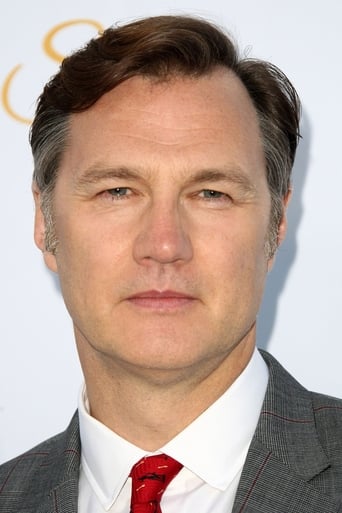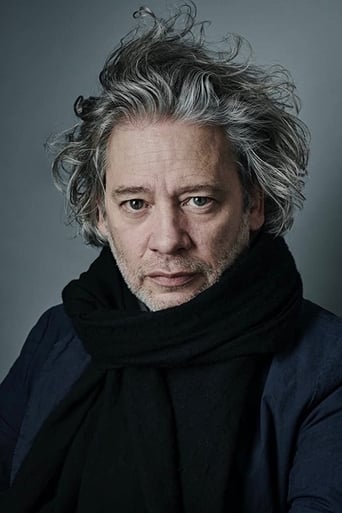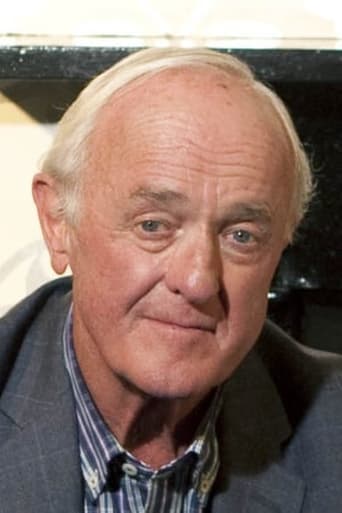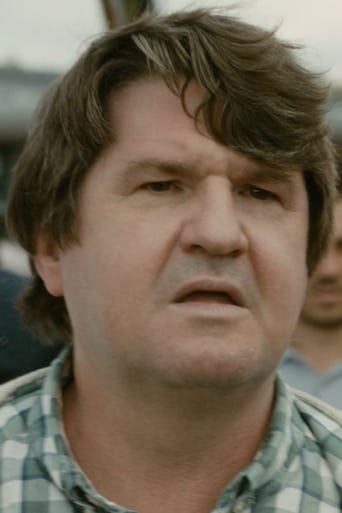NekoHomey
Purely Joyful Movie!
CrawlerChunky
In truth, there is barely enough story here to make a film.
AshUnow
This is a small, humorous movie in some ways, but it has a huge heart. What a nice experience.
Portia Hilton
Blistering performances.
George Wright
Stephen Frears has done some excellent movies documenting recent British social and political history. In this particular movie, he gives us the background to Tony Blair's ascendancy to the leadership of the British Labour Party. After getting a seat in Parliament in 1983, Tony Blair, performed by Michael Sheen, was very much a junior to the formidable Scot named Gordon Brown, a longtime member of the party, played by David Morrissey. We see Blair looking for office space after his election and sharing a room with Brown as the two become friends during the Thatcher era. Brown is an intellectual with a thick Scottish accent and brooding manner. He does his homework and gives a rousing first speech. Tony Blair takes himself and his work much less seriously and seems very much a lightweight but his easy manner and likability pay dividends down the road. I enjoyed David Morrissey in the Gordon Brown role and got an appreciation for the difficult spot he found himself in when he eventually succeeded Blair as leader in 2007. Michael Sheen is a competent actor, playing Blair in The Queen and The Special Relationship and also David Frost when he faced Richard Nixon in a series of interviews. The movie is also interwoven with actual film clips from the era of Thatcher, and Labour Leaders Neil Kinnock and Michael Foote. We see how Brown, for all his apparent ambition, seems to hold back when opportunity knocks while the less goal driven Tony Blair eventually sails toward the leadership by force of personality and good luck. This movie was made before Tony Blair stepped down as prime minister and we know Gordon Brown was defeated in 2010 without ever winning an election on his own. Life can be unfair but Tony Blair did in his final years, face difficult times and left office discredited by the war in Iraq. His personal popularity has never recovered. Two great politicians are contrasted here and the movie sheds great light on their personal friendship and rivalry.
Emil Bakkum
The film The Deal elaborates on the relationship of Tony Blair and Gordon Brown during the first years of their political careers. Both men are extremely ambitious, and strive for the party leadership. However their efforts are strikingly different, because of their opposite characters. Blair is eager, always willing to try his luck, and if necessary to subject and serve under a stronger leader. On the psychological level Blair is the extrovert politician, with the ability to show empathy, thus fostering excellent external contacts. He has a disliking for party principles, that might isolate him from society. Brown openly vents his ambitions, and refuses to do tasks, that are below his standards. He is the introvert person, that values the party principles and defends them with ardor and sometimes coarseness (the Labour Party is an association of workmen). Evidently the film The Deal is above all things a character study, and the political background is of only secondary relevance. The story could equally well have portrayed two men, competing for the position of head of the sales department. The political setting is highlighted mainly by the inclusion of footage from live television recordings. For instance we witness a congress of the Labour Party in the eighties, where the crowd sings their hymn The Red Flag. In the mutual relationship Brown makes clear to Blair, that he (Brown) is the primary candidate for the position of party leader. Blair accepts with a mocking overtone. In the mean time party leader Neil Kinnock is defeated by Thatcher, and is replaced by John Smith. When Smith suffers a deadly heart attack, the competition between Brown and Blair reaches its climax. Blair publicly announces his availability as successor, and Brown reacts furiously. He raves: "We had an understanding!" However, it seems that Blair has the better testimonials. His extrovert attitude makes him attractive to the so-called floating voters, who are as yet irresolute. This brings him the support of many party officials, perhaps the majority. Brown has the backing of the traditional Labour strongholds, and a stalemate is forthcoming. Borwn had hoped that the party would prefer him as a matter of course, and apparently fears the confrontation with Blair. Some party officials reproach Brown, that he had never challenged the leadership of Smith. His qualities are called in question. Eventually it is Blair, who reaches out to Brown, and offers him a strong position in a cabinet under his leadership. In addition a vague agreement is made, that Brown will be Blairs successor - rather strange, since both men are of the same age. It reflects the consideration of a senior party official: "What Brown needs, is hope". Surprisingly, Brown accepts, although the job is below his own standard. The film ends here. In 1997 the Labour Party under Blair won the elections, and remained in power until 2009. The Labour Party was reformed, and shifted to the right wing of the social-democracy. Later Blair succumbed to the wishes of Bush with regard to the invasion of Iraq, which made his position within the party untenable. However, even then Brown was unable to topple him. I think that The Deal gives an excellent portrayal of the personal drama, that is attached especially to political careers. In politics a failed candidate can not apply with a competitor, like in business: it is now or never. If you appreciate this type of films, you may consider seeing my reviews of Im Schatten der Macht (Willy Brandt), Jean Jaures, Therese et Leon (Leon Blum), Changer la vie! (Francois Mitterrand), Nynke (Piter Jelles Troelstra) or Den Uyl en de affaire Lockheed (Joop den Uyl). Warning: English subtitles are the odd exception, sorry.
a_2
The beauty of 'The Deal' is clearly the story, and for many a surprising and unknown real story. Peter Morgan does what he does best again by keeping the screenplay no nonsense and captures the delicacies of the time brilliantly. While many who may have in depth knowledge of the matter could have differing opinions on its deviations from reality, the movie is a very fine quality drama from a team which has given gems like Queen and Frost/Nixon.Michael sheen is fantastic again and David Morrissey is more impressive than sheen. A story very admirably directed and acted, this story captures politics and drama behind a real story joyfully - a match made in heaven!
bob the moo
It is approaching an election in the UK when the leader of the Labour party, John Smith, suffers another in a line of heart attacks and dies. With the leadership campaign about to start the clear choice appears to be Gordon Brown, a stanch Scotsman. However Tony Blair is also beginning to appear more likely as he will appeal to Southern voters who would be turned off by Brown. Blair rings Brown to arrange a meeting to discuss which will go for the job. The film flashbacks to the start of their relationship, sharing an office in Westminster on their first seats.I have recently seen a BBC political drama (The Project) which was focused around the rise (and perversion) of Labour - it lasted 4 hours and was unlikely to win over anyone who wasn't already suitably informed about the topic. The Deal, on the other hand, is 90 minutes long and is a punchy little summary of the supposed deal brokered between Blair and Brown to prevent them having to battle for the party leadership in the wake of John Smith's death. This is worthwhile as it is likely to attract those not actually into politics but just looking for a reasonable drama to pass the time.As such it moves along quite well. It covers lot of ground quite quickly and will give those lacking the knowledge (like me) a good understanding of the political landscape of the time. It also has a certain amount of drama - some of which is real and some of which is provided by characters and sinister direction. The one flaw I did feel it had was that it was a drama and not a documentary, to that end dialogue has been created and scenes are the combination of sources and records. This is still good but it has the effect that we can't take everything at face value - I would have preferred if more sources were clearly defined and the facts more clearly established. The fact that the whole film is a drama means that I couldn't be sure how much of the film (or how little) was actually artistic license.The cast are good. The better role is Morrissey as Brown. He manages to get his mannerisms right without letting it turn into a impression, he plays him as a dour character (which Brown pleaded innocence of the next day on the BBC, despite claiming not to have seen the film) which is the image many have of him, but he does bring him to life well. Sheen's Blair is also good but is more of a mimic than a real character - it hard to describe but it felt like he had spent more time focusing on the mannerisms than the character , although, that said, he did bring another layer out at some points (witness his face change as Brown leaves the restaurant at the end). Rhys' Mandelson is too much of an effort to be sinister and didn't work for me - the Mandelson that we have seen is more lively and overt than this, he does have his sinister side but the fact that it is in this colourful shell makes it more interesting, that wasn't brought out. The support cast is good but this is a two-hander and the two characters carry it well - even if the restaurant scene is not exactly the equal of Heat!Overall this works well as a political drama which will reach those not normally reached by this type of material. However the fact that the facts were mixed with dramatised and fictional scenes was a problem for me and I wasn't totally sure what bits were real and what bits were interpreted. Still an enjoyable film nonetheless.





